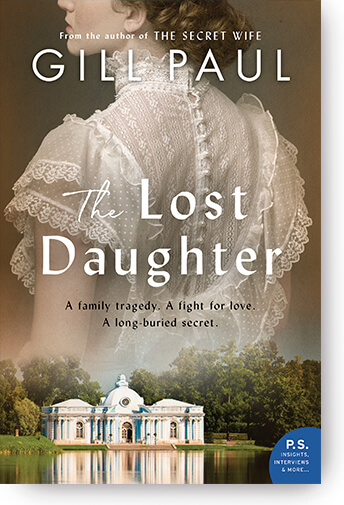The Lost Daughter
A family tragedy. A fight for love. A long-buried secret.
1918 With the country they once ruled turned against them, the future of Russia’s imperial family hangs in the balance. When middle daughter Maria Romanova captivates two of the guards, it will lead to a fateful choice between right and wrong. Fifty-five years later . . . Val rushes to her father’s bedside when she hears of his troubling end-of-life confession: ‘I didn’t want to kill her.’ As she unravels the secrets behind her mother’s disappearance when she was twelve years old, she finds herself caught up in one of the world’s greatest mysteries.
Published in the UK on 18th October 2018.
Published in the US in 2019.

Reviews
“Gill Paul has created Maria with such strength that she springs from the pages … Deeply moving, but never without hope.” Woman’s Weekly
“A brilliantly emotional read” Woman’s Own
“As rich in historical detail as it is captivating” Heatworld
“A story meticulously researched with a real sense of hope.” Woman
“Gill Paul is a fabulous writer of historical fiction, taking true-life events and real people and giving them flesh, bones and spirit in a way no dull historical tome ever could.” My Weekly
“A fascinating read set against turbulent times” People’s Friend
“Bold and powerful, filled with emotion, tension and vivid characters in a setting that is rich in historical detail. Gill Paul deepens our understanding of the traumatic events in early 20th century Russia with her impressive research and imaginative insight into the period and the Romanov family. And the love story? Intense and passionate, it will grip your heart. I loved it” Kate Furnivall
“Fascinating! Gill Paul captures this family and this period of history so vividly. Such a wonderful book!” Hazel Gaynor
“Completely immersive. Gorgeous. Beautiful writing, great characters. I enjoyed it so, so much. Just brilliant!” Jenny Ashcroft
“Another brilliant read from Gill Paul. Two gripping stories entwine and kept me captivated till the last page. Kept me looking forward to getting back to it each evening.” Tracy Rees
“I’m always so impressed by the depth of Gill Paul’s knowledge of the periods she chooses to write about. With The Lost Daughter, she has returned to the tragic Romanovs, creating another fascinating story that asks the haunting question: ‘what if one of them escaped?’ A pleasure to dive into.” Kate Riordan
“I devoured it in two days. I adored it. Gill Paul makes complex history so accessible. So real. Truly exceptional” Louise Beech
Reading group questions
- Do you think a marriage could work between a couple with such opposite backgrounds as Maria and Peter? They came from different social classes, in an era when that meant a whole lot more than it does now; he was far less educated than her in the academic sense; he did not believe in the religion that meant so much to her; and his political beliefs were at odds with her family’s heritage. Did the relationship convince you in the novel?
- Both Maria and Val believed that they grew stronger over the years. Do you think their characters developed through the course of the novel? Or did they just learn to cope with adversity through necessity?
- Val’s experience of a violent marriage is quite common: many domestic abuse survivors say that the worst violence occurred in the early days, and after that they were scared and did all they could to avoid confrontation. Why do so many women stay in such marriages and only leave in order to protect their children? Is it to do with low self-esteem? Lack of money? Because they still love the men despite everything?
- Is Tony simply a monster or do you get a sense of why he is violent and controlling? Can you understand why Val married him?
- There are many different locations in this book. Which one was the most vivid for you?
- Was there enough explanation of Russian history for those who did not know much about it before? Some readers Google as they go along, and that’s fine, but ideally the book should stand alone without any additional explanation.
- The siege of Leningrad was one of the most harrowing aspects of the Second World War yet little was written about it for several decades afterwards. The Soviet government discouraged discussion, simply saying that ‘life was hard for Leningraders’, and it is only recently that historians have collected and published oral testimonies from those who lived through it. Did you feel you got a sense of the developing tragedy from the novel?
- Did the novel make you consider how you would survive in a police state? Would you inform on your neighbours and/or work colleagues to protect your children, for example?
- We only get glimpses of the complex character of Val’s father, and most of these are damning. Did the priest’s words make you re-evaluate him?
- One theme of the novel is fatherhood: what it means to be a good or a bad father. What do you think makes a good father? How does it affect children if they have a bad father?
- Stepan resembles Peter in his character and his moral outlook although he is not his biological son. Would he have been a different person if he had been raised by Anatoly? In other words, is nurture more important than nature?
- Why do you think so many people claimed to be Romanovs after the family’s disappearance? Were they doing it for attention? In the hope of claiming the family fortune? Or were they deranged and actually believed it themselves?
- If one of the Romanov children had survived, would we ever find out?
- Did you read The Secret Wife before this? If so, compare the two books. Which do you prefer, and why?
